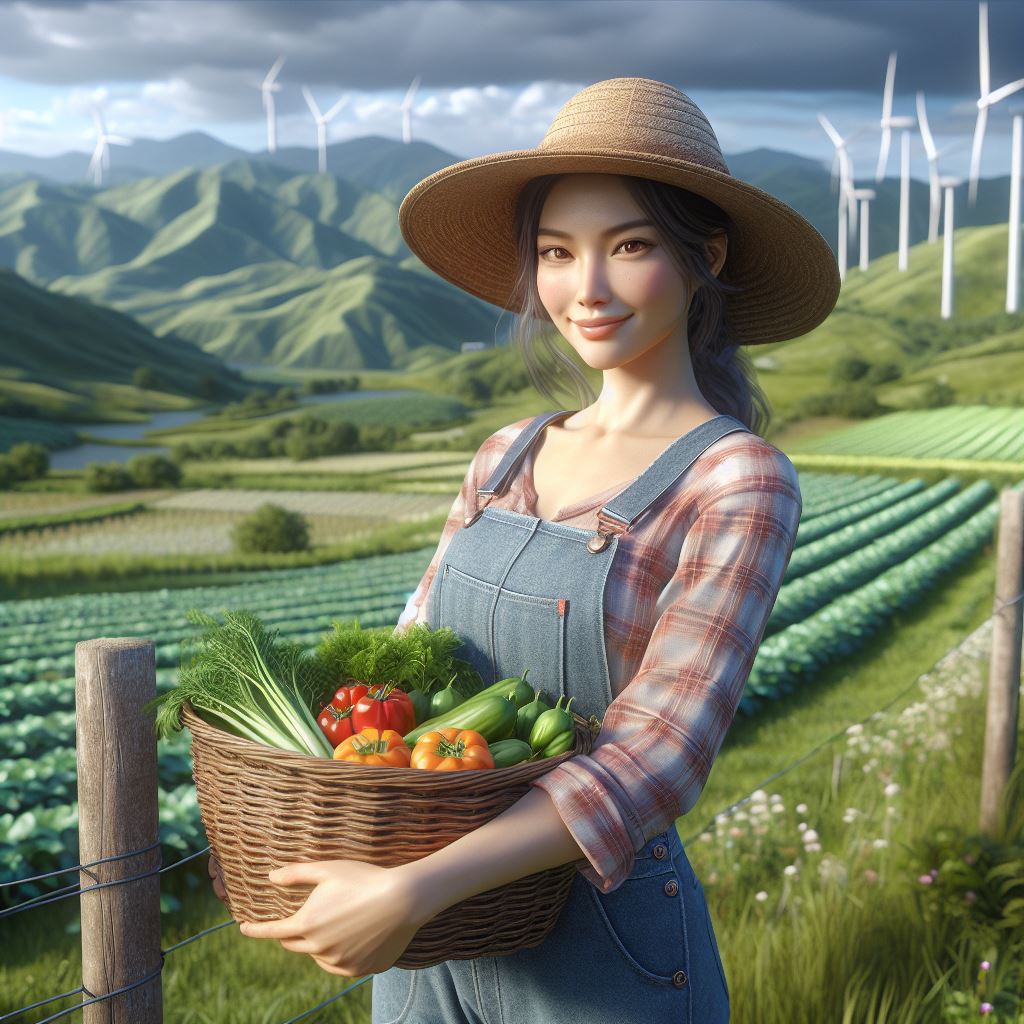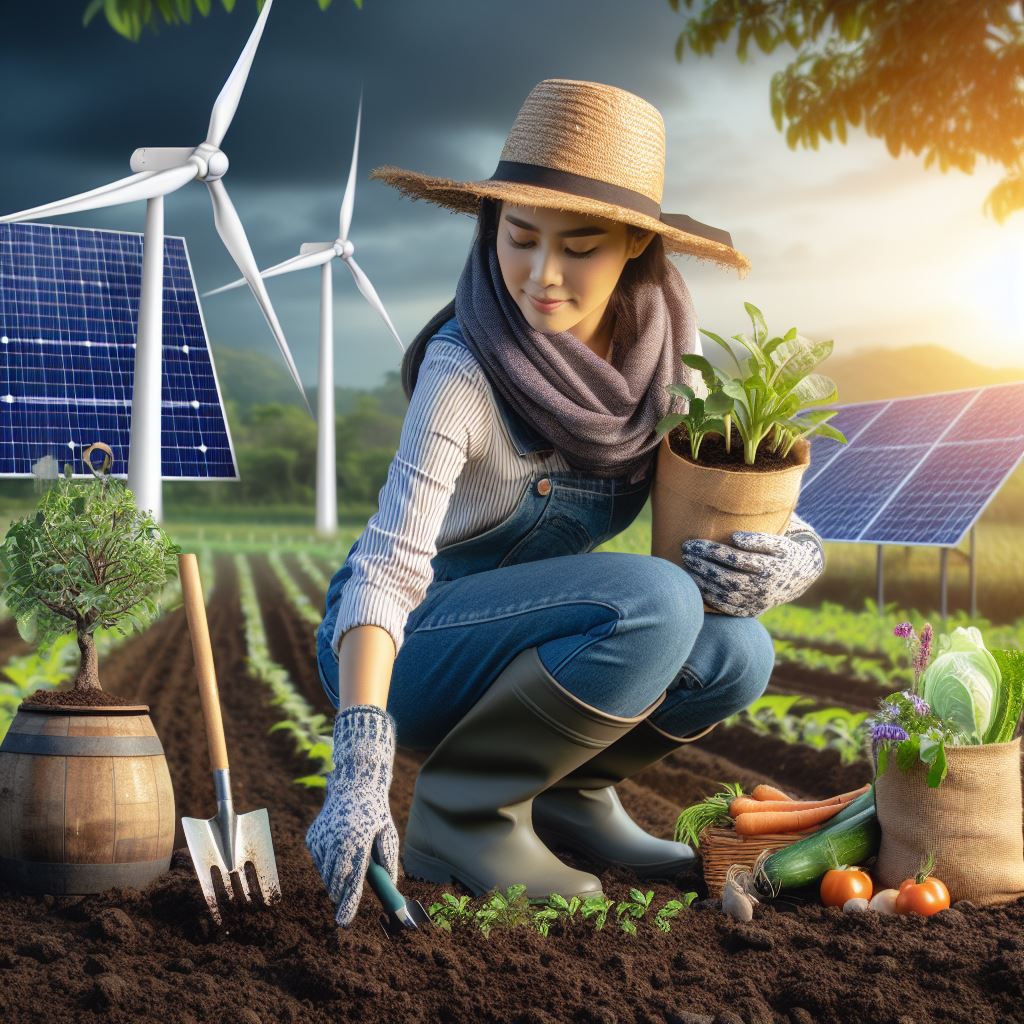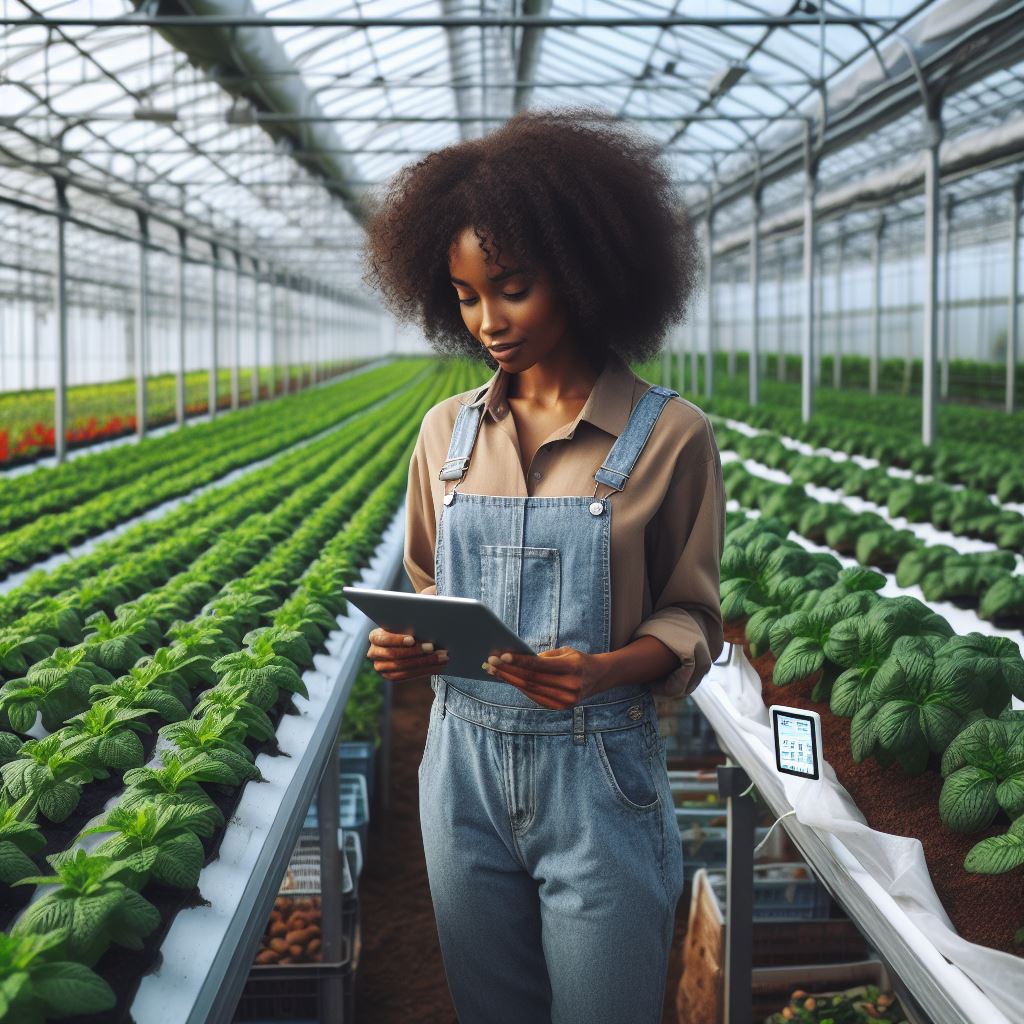Introduction
The relevance and importance of discussing the future of farming
The future of farming holds great importance as we face challenges posed by climate change.
By incorporating Artificial Intelligence (AI) into farming practices, we can overcome these challenges and reap numerous benefits.
However, this integration also comes with its fair share of challenges.
The two main components: AI (Artificial Intelligence) and climate change
The relevance of discussing the future of farming lies in the need to ensure sustainable food production to meet the growing global demand.
With climate change impacting weather patterns and leading to resource scarcity, traditional farming methods are becoming insufficient.
AI offers a promising solution to enhance agricultural practices.
AI, an advanced technology that enables machines to simulate human intelligence, can revolutionize farming.
By automating tasks such as harvesting, irrigation, and pest control, AI improves efficiency and reduces labor-intensive work.
Moreover, AI-powered sensors and drones can monitor crop health, optimize water usage, and detect diseases early, leading to higher yields.
The potential benefits and challenges involved
However, integrating AI into farming practices also presents challenges.
The initial cost of implementing AI technologies may hinder adoption, especially for small-scale farmers.
Additionally, the reliance on technology raises concerns about data security and privacy.
Nonetheless, governments and organizations must address these challenges to unlock the full potential of AI in farming.
Climate change exacerbates the need for AI in farming.
With unpredictable weather patterns, farmers struggle to adapt traditional techniques to changing conditions.
AI can analyze climate data, predict environmental changes, and offer real-time recommendations, enabling farmers to make informed decisions.
This could mitigate the impact of climate change and ensure the resilience of agricultural systems.
In fact, discussing the future of farming, particularly in regards to AI and climate change, is crucial for sustainable food production.
While AI offers significant benefits in terms of efficiency and productivity, challenges such as cost and data security must be addressed.
By embracing AI and combating climate change, we can ensure a brighter future for farming.
AI in Farming
AI can revolutionize farming techniques
AI has the power to completely transform farming techniques, bringing about a revolution in the agricultural industry.
The use of drones, robots, and sensors in agriculture
With advancements in technology, the use of drones, robots, and sensors in agriculture has become increasingly common.
these technologies have the potential to improve efficiency, increase productivity, and reduce costs.
Drones, equipped with imaging technology, can provide valuable insights into crop health and growth patterns.
They can monitor the condition of crops, detect diseases, and help farmers make informed decisions about irrigation, fertilization, and pesticide application.
Robots, on the other hand, can be used for various tasks such as planting, harvesting, and weeding.
They can operate autonomously or be remotely controlled, reducing the need for manual labor and increasing productivity.
With AI algorithms, these robots can also learn and adapt to different farming environments, optimizing their performance over time.
Sensors play a crucial role in collecting data related to soil moisture, temperature, and nutrient levels.
They provide real-time information, enabling farmers to make data-driven decisions and optimize resource utilization accordingly.
The potential of AI in crop yield prediction and disease detection
AI algorithms can analyze the sensor data and suggest the ideal conditions for plant growth, leading to improved crop yield and quality.
One of the most promising applications of AI in farming is crop yield prediction.
By analyzing historical data, weather patterns, and other variables, AI can forecast future crop yields accurately.
This information can help farmers plan their harvest, estimate profitability, and make informed decisions about pricing and marketing.
Furthermore, AI can aid in the early detection and prevention of diseases in crops.
By analyzing images of plants and leaves, AI algorithms can identify signs of diseases or pest infestations before they become widespread.
This allows farmers to take proactive measures, such as targeted treatment or quarantine, to prevent further damage and minimize crop losses.
The role of AI in optimizing resource utilization and reducing waste
In addition to crop management, AI can optimize resource utilization and reduce waste in farming.
By analyzing data on water usage, fertilizers, and energy consumption, AI algorithms can suggest ways to minimize waste and improve efficiency.
This can lead to significant cost savings and a more sustainable approach to agriculture.
Transform Your Agribusiness
Unlock your farm's potential with expert advice tailored to your needs. Get actionable steps that drive real results.
Get StartedOverall, the potential of AI in farming is vast and transformative.
It can revolutionize traditional farming techniques, increase productivity, and ensure food security in the face of climate change.
However, it is important to address the challenges associated with the adoption of AI in agriculture, such as cost, accessibility, and data privacy concerns.
In short, AI has the power to revolutionize farming techniques by automating tasks, optimizing resource utilization, and improving crop yield prediction and disease detection.
The use of drones, robots, and sensors can bring about significant advancements in the agricultural industry.
As we embrace AI in farming, it is essential to ensure accessibility, affordability, and ethical use of this technology.
By harnessing the potential of AI, we can secure a sustainable and efficient future for agriculture.
Read: Seasonal Guide to Vegetable Farming Success
Benefits of AI in Farming
Artificial Intelligence (AI) technologies have the potential to revolutionize the farming industry, bringing numerous benefits to farmers and the environment.
Improved Efficiency and Productivity
- AI-powered systems can automate and streamline various farming processes, saving time and effort for farmers.
- By using machine learning algorithms, AI can analyze vast amounts of data to optimize resource allocation.
- This helps farmers make more informed decisions regarding crop planting, irrigation, fertilizer application, and pest management.
- With AI, tasks that were traditionally labor-intensive can now be accomplished more efficiently, boosting overall productivity.
Potential for Increased Crop Yields and Reduced Costs
- AI can enhance crop yield predictions by analyzing factors like weather patterns, soil conditions, and historical data.
- By accurately predicting potential yields, farmers can optimize their production strategies and improve overall crop output.
- Additionally, AI-driven systems can reduce costs by minimizing resource waste and optimizing resource utilization.
- By implementing precision agriculture techniques, farmers can ensure that resources such as water and fertilizers are used effectively.
Assistance in Decision Making and Planning
- AI technologies can provide farmers with valuable insights and recommendations to aid in decision making.
- By analyzing data from various sources, AI can provide accurate predictions on market trends and demand fluctuations.
- This information empowers farmers to make smarter choices regarding crop selection, pricing, and market timing.
- AI can also assist in planning by generating automated schedules for activities like planting, harvesting, and maintenance.
Minimization of Environmental Impact
- AI can play a crucial role in mitigating the environmental impact of farming practices.
- By analyzing environmental data, AI can optimize irrigation systems to minimize water usage and prevent water wastage.
- AI-powered drones and robots can precisely apply pesticides and fertilizers, reducing chemical usage and minimizing runoff.
- Furthermore, AI can contribute to sustainable farming practices by promoting crop rotation and soil health management.
In general, the benefits of AI in farming are far-reaching.
Improved efficiency and productivity, increased crop yields, and reduced costs are just a few advantages that AI can provide to the farming industry.
Additionally, AI can assist farmers in decision making and planning while minimizing environmental impact.
With the integration of AI technologies, the future of farming looks promising, with the potential to address challenges posed by climate change and ensure sustainable agricultural practices.
Read: Precision Agriculture: Tech in Crop Cultivation
Challenges and Limitations of AI in Farming
As AI continues to advance, its potential applications in various industries, including farming, are being explored.
However, there are several challenges and limitations that need to be addressed to ensure its successful integration into agricultural practices.
Concerns about the replacement of human labor in farming
One of the major concerns surrounding AI in farming is the potential displacement of human labor.
While AI can automate certain tasks and increase efficiency, it is crucial to strike a balance between technology and human involvement.
Farmers should be reassured that AI is intended to assist, not replace, their expertise and experience.
The potential bias in AI algorithms and the need for diversity in dataset
An essential consideration in the implementation of AI algorithms in farming is the potential bias that may arise from the data used to train these algorithms.
Lack of diversity in datasets can lead to biased predictions and recommendations, negatively impacting farming practices.
It is vital to ensure a wide range of data sources and perspectives to combat bias and foster inclusivity in AI technologies.
The challenges of implementing AI technologies in farming, especially for small-scale farmers or in developing countries
While AI has the potential to revolutionize farming practices, the implementation of these technologies can be challenging, particularly for small-scale farmers or in developing countries.
Issues such as high costs, limited access to technology, and inadequate infrastructure pose obstacles to the widespread adoption of AI in agriculture.
Efforts should be made to make AI solutions affordable, accessible, and tailored to the specific needs of different farming communities.
Importance of ensuring data privacy and security
With the increased reliance on AI technologies, the collection, storage, and analysis of vast amounts of data become essential.
However, ensuring data privacy and security is a significant concern.
Farmers need to be assured that their data will be protected from unauthorized access and misuse.
Transparency and robust security measures must be in place to build trust and encourage the adoption of AI in farming.
In review, while AI holds immense potential in transforming the future of farming, there are several challenges and limitations that need to be addressed.
Striking a balance between technology and human involvement, combating bias in AI algorithms, facilitating accessibility for small-scale farmers, and ensuring data privacy and security are crucial steps in harnessing the full benefits of AI in agriculture.
By addressing these concerns, we can pave the way for a sustainable and efficient future of farming.
Read: Cover Crops: Advantages in Crop Management

Climate Change and Agriculture
Climate change is having a significant impact on agriculture and the future of farming.
Changing weather patterns and extreme events are posing numerous challenges for farmers worldwide.
In order to address these challenges, it is essential for farmers to adapt their practices and explore sustainable solutions.
Additionally, the potential role of Artificial Intelligence (AI) in mitigating the effects of climate change in agriculture is an exciting avenue to explore.
Impact of Climate Change on Farming
- Climate change is causing shifts in temperature, precipitation, and weather patterns, which directly affect agricultural productivity.
- Higher temperatures can impact crop yields, while changes in precipitation can lead to droughts or floods, affecting water availability and soil quality.
- Rising sea levels and increased coastal erosion pose threats to farmland, especially in low-lying regions.
Challenges Faced by Farmers
- Changing weather patterns make it difficult for farmers to predict and plan their planting and harvesting schedules.
- Extreme events such as hurricanes, tornadoes, and heatwaves can result in crop damage or complete loss.
- Pests and diseases are becoming more prevalent due to the changing climate, leading to increased crop losses.
Adapting Farming Practices and Sustainable Solutions
- Widespread adoption of climate-smart agriculture practices can help farmers adapt to changing conditions.
- These practices include water management, crop diversification, soil conservation, and precision farming techniques.
- Investing in sustainable solutions like agroforestry, organic farming, and hydroponics can also enhance resilience in the face of climate change.
Potential Role of AI in Mitigating Climate Change Effects
- AI can provide valuable insights and predictions about weather patterns, enabling farmers to make informed decisions.
- Machine learning algorithms can analyze large sets of climate and soil data to optimize irrigation schedules and fertilizer use.
- AI-powered drones and robots can assist in monitoring crops, detecting diseases, and applying targeted treatments, reducing chemical usage.
- Smart sensors and IoT devices integrated with AI can enable real-time monitoring of environmental conditions for better resource management.
In closing, climate change poses significant challenges for agriculture, but with the right adaptation strategies and sustainable practices, farmers can mitigate its impact.
The integration of AI technologies in farming holds immense potential to revolutionize the industry by providing data-driven insights and optimizing resource utilization.
By leveraging AI, farmers can enhance their resilience, reduce environmental impact, and contribute to the fight against climate change.
Read: Techniques for Healthy Soybean Growth
See Related Content: Futuristic Farm Tools: Tomorrow’s Agriculture
AI’s Role in Sustainable Agriculture
As climate change continues to impact our planet, the future of farming looks uncertain.
However, one technology stands out as a potential game-changer: artificial intelligence (AI).
Through its ability to process large amounts of data and make accurate predictions, AI can revolutionize sustainable agriculture.
In this section, we will explore the various ways AI can contribute to the future of farming.
AI can assist in predicting weather patterns and improving crop management
Firstly, AI can assist farmers in predicting weather patterns, which is crucial for effective crop management.
By analyzing historical weather data and real-time information, AI algorithms can provide accurate forecasts.
This knowledge enables farmers to make informed decisions regarding planting, harvesting, and managing their crops.
With AI, farmers can proactively adapt to climate changes and minimize the risk of crop failure.
The potential for AI to optimize irrigation systems and reduce water usage
Moreover, AI has the potential to optimize irrigation systems, reducing water usage and improving resource efficiency.
By collecting data on soil moisture levels, weather conditions, and crop water requirements, AI algorithms can precisely determine when and how much water to apply.
This targeted approach ensures that crops receive adequate irrigation while minimizing wastage.
As freshwater scarcity becomes an increasingly pressing issue, AI can help farmers conserve this valuable resource.
The role of AI in developing climate-resistant crops and sustainable farming practices
Another important role of AI in sustainable agriculture lies in developing climate-resistant crops.
AI can analyze vast amounts of genetic data to identify traits that make crops more resilient to climate change.
By understanding which genes contribute to tolerance to heat, drought, or other extreme weather conditions, scientists can breed crops that are better adapted to the changing climate.
This could enhance crop yields and food security in the face of climate-related challenges.
Furthermore, AI can play a crucial part in promoting sustainable farming practices.
By analyzing data on soil health, nutrient levels, and pest infestations, AI algorithms can offer personalized recommendations to farmers.
These recommendations can include specific fertilization plans, pest control strategies, and crop rotation techniques tailored to the unique conditions of each farm.
By optimizing inputs and reducing chemical usage, farmers can minimize their environmental impact and improve the sustainability of their operations.
The importance of collaboration between AI experts and farmers to develop tailored solutions
Collaboration between AI experts and farmers is vital for the successful implementation of AI technologies in agriculture.
AI experts can provide the technical expertise needed to develop and fine-tune AI algorithms, while farmers bring their practical knowledge and experience.
This collaboration can ensure that AI-based solutions are practical, accessible, and address the real-life challenges faced by farmers.
By working together, AI experts and farmers can develop tailored solutions that maximize the benefits of AI in sustainable agriculture.
Basically, AI has a significant role to play in the future of farming amidst the challenges posed by climate change.
Its ability to predict weather patterns, optimize irrigation systems, develop climate-resistant crops, and promote sustainable practices makes it a powerful tool for sustainable agriculture.
However, it is crucial to recognize that AI alone cannot solve all the problems.
Collaboration, knowledge exchange, and a holistic approach are essential to create a sustainable future for farming.
By harnessing the potential of AI and working together, we can ensure a resilient and sustainable food system for generations to come.
Showcase Your Farming Business
Publish your professional farming services profile on our blog for a one-time fee of $200 and reach a dedicated audience of farmers and agribusiness owners.
Publish Your ProfileSee Related Content: Tech Tools Transforming Modern Crop Cultivation
Conclusion
AI has the potential to revolutionize farming and tackle the challenges posed by climate change.
By using AI technologies, farmers can optimize their crop production, reduce waste, and improve resource management.
This can lead to increased food security, reduced greenhouse gas emissions, and efficient water usage.
However, to fully harness the benefits of AI in farming, continuous research and innovation are crucial.
This will ensure that AI systems are constantly improved and adapted to changing environmental conditions. Moreover, collaborative efforts between farmers, researchers, and policymakers are essential for effective implementation of AI technologies.
Therefore, it is imperative for farmers and policymakers to embrace AI technologies and sustainable practices.
By integrating AI into farming systems, we can create a resilient future where agriculture is both productive and environmentally sustainable.
This will not only lead to economic benefits but also contribute to mitigating the impacts of climate change.
In summary, the future of farming lies in the synergy between AI and climate change.
Through the adoption of AI technologies and sustainable practices, we can transform agriculture into a thriving and resilient industry.
Let us seize the opportunities presented by AI and work towards a more sustainable and prosperous future.




